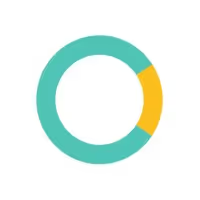DealHub Alternatives
An in-depth comparison of 10 DealHub alternatives. We analyze features, pricing, and ideal use cases to help you select the right platform.

DealHub is a popular choice, and for good reason. It's strong for proposal creation and lets you track document engagement. For these specific tasks, it performs well, which is why many teams choose it.
However, some users report a complex initial setup or find certain integrations tricky. This might be why you seek an alternative. We analyzed the best options to help you compare them with DealHub based on G2 reviews. Let's get started.
Consider 11x for Your Sales Efforts
If your team wants to use digital workers for sales, consider 11x. It provides a different approach and automates sales development representative (SDR) activities. This may be a relevant option for your specific needs.
11x is a GTM platform that uses AI agents to manage the sales process. Its AI agent, Alice, finds prospects, runs outreach on email and LinkedIn, and keeps your CRM updated.
A second agent, Julian, qualifies inbound leads and books meetings. This approach consolidates data enrichment, outreach, and email warmup tools into a single platform.
DealHub Alternatives
The following section provides a detailed review of the main alternatives to DealHub. Each option is analyzed based on its pricing, features, and specific advantages or potential drawbacks in comparison.
1) Salesforce CPQ
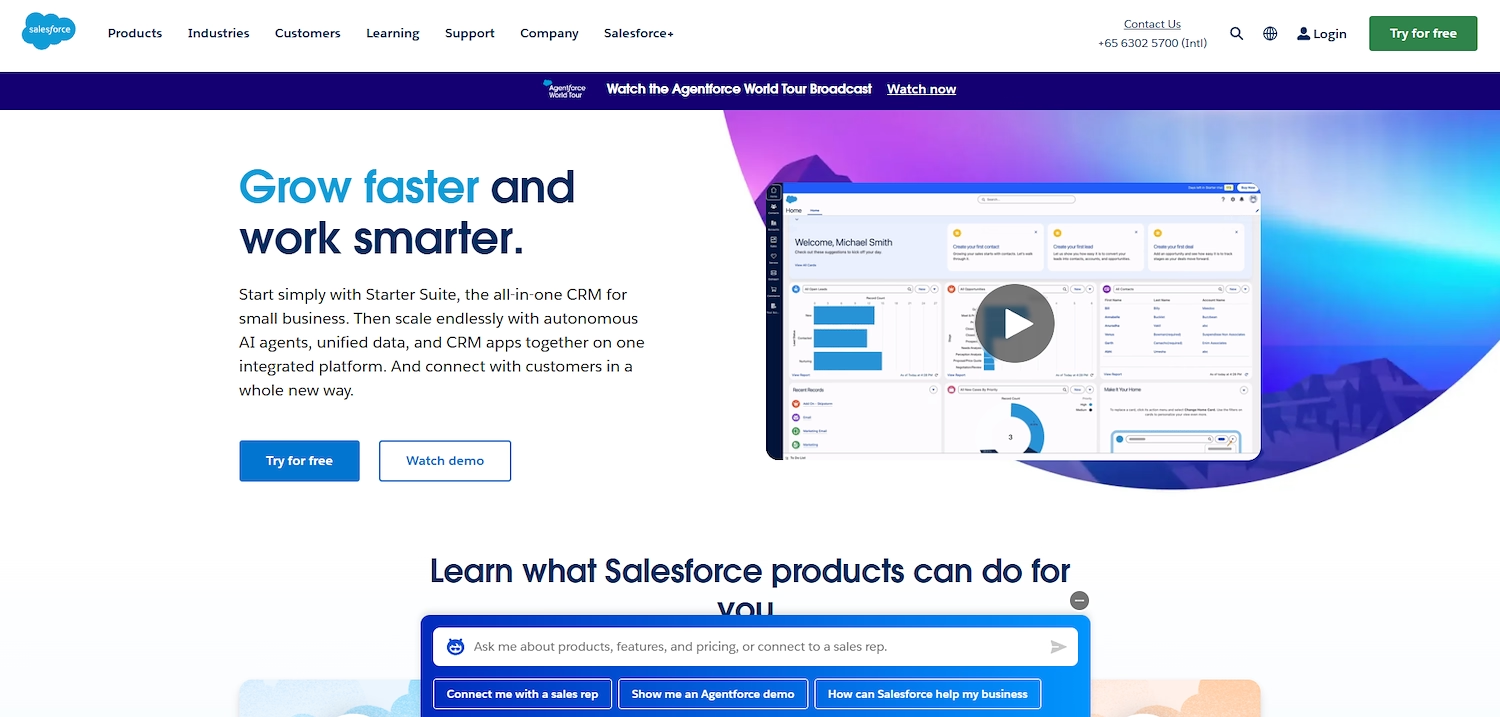
Salesforce CPQ is a tool inside the Salesforce ecosystem. It helps sales teams configure products, set prices, and create quotes. The software generates branded proposals and contracts from within the CRM. This function supports sales reps with complex product configurations.
It automates parts of the quote-to-cash process. It is a native solution for companies that already use the Salesforce platform for their sales operations.
Salesforce CPQ's Main Features
- Configures complex products, sets pricing rules, and generates quotes.
- Creates branded proposals and contracts directly from the CRM.
- Automates parts of the quote-to-cash process for sales teams.
- Operates as a native solution within the Salesforce ecosystem.
How Salesforce CPQ Compares to DealHub
Average Review score: 4.2/5 stars based on 1,415 G2 reviews.
- Salesforce CPQ operates natively within the Salesforce platform, which provides a more unified experience compared to DealHub's third-party integration.
- It extends beyond quoting to include order and invoice management and provides a more complete quote-to-cash solution than DealHub.
- The tool includes full contract lifecycle management for agreements, from negotiation to final review, which is more comprehensive than standard proposal generation.
- This platform provides dedicated tools for subscription management and billing, a specific function not central to DealHub's core offering.
- Salesforce CPQ handles highly complex product configurations and pricing rules, which is useful for businesses with intricate product catalogs.
Potential Drawbacks Compared to DealHub
- Salesforce CPQ sometimes has a more complex initial setup than DealHub, which may require more resources to implement.
- Its focus on the entire quote-to-cash process can be less intuitive for teams that only need proposal and quote features, unlike DealHub's specialized platform.
- Some users report that customization of the platform is difficult without specialized knowledge, while DealHub offers more direct options for its core features.
Pricing and Cost Comparison
Salesforce does not publish its CPQ pricing, but it is positioned as a premium, enterprise-level solution. For an accurate quote based on your needs, you should contact Salesforce directly through their official website.
2) Conga CPQ
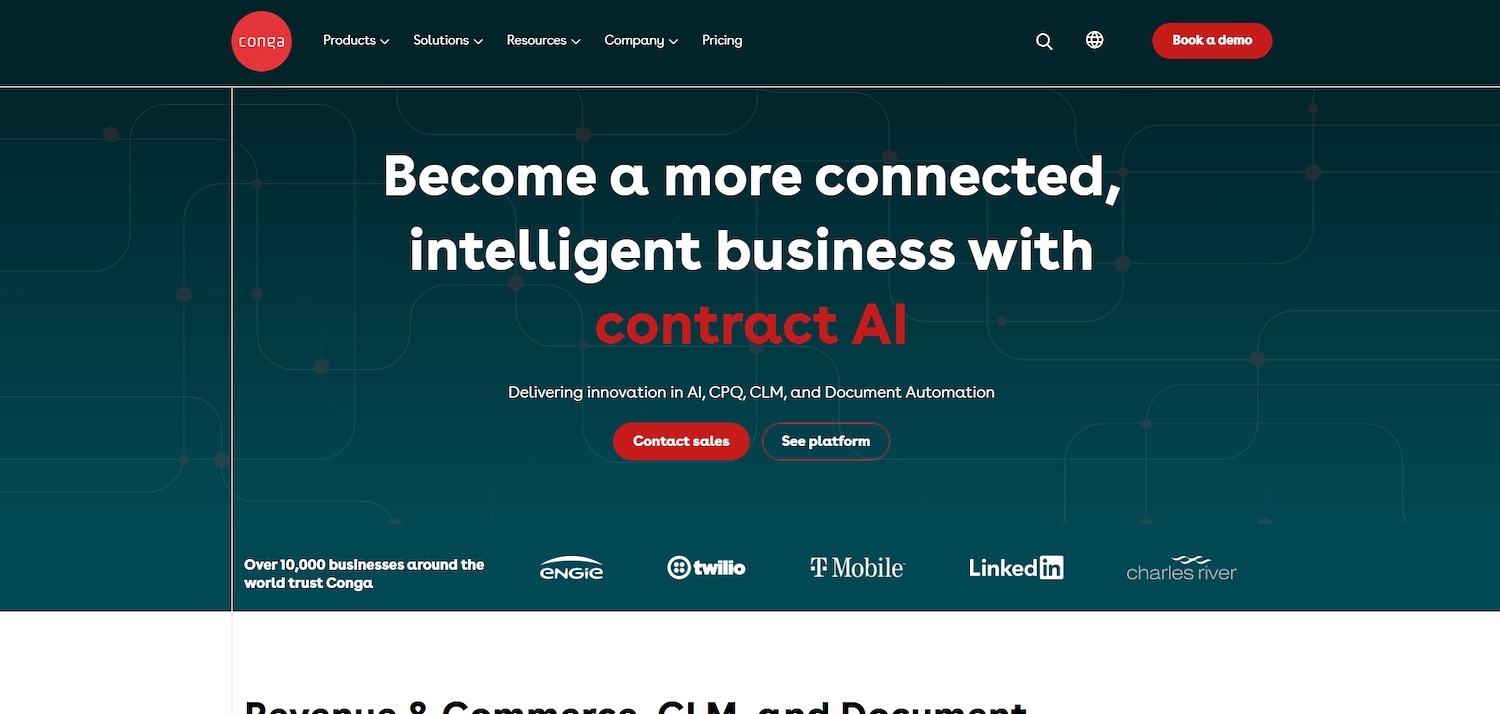
Conga CPQ is a platform that automates the sales quote process. It helps sales teams create accurate quotes for complex product and service configurations. The software generates proposals and other sales documents for review.
It also provides tools to manage pricing rules and discounts. This supports a consistent sales strategy across the organization. The tool is for teams that need detailed document and proposal management.
Conga CPQ's Main Features
- Automates the sales quote process for complex product and service configurations.
- Generates proposals and other sales documents for review.
- Provides tools to manage pricing rules and discounts.
- Supports detailed document and proposal management for sales teams.
How Conga CPQ Compares to DealHub
Average Review score: 4.0/5 stars based on 178 G2 reviews.
- Conga CPQ includes a built-in approvals workflow for pricing and legal reviews. This automates a step that might require manual work in DealHub, which focuses more on proposal generation.
- It offers a guided selling feature that helps sales reps select the right products and pricing. This provides more structure during the quoting process compared to DealHub's more open-ended proposal creation.
- The tool provides dynamic pricing and discounting rules. This allows for more complex and automated pricing strategies than the standard quoting functions found in DealHub.
- Conga CPQ is part of a larger suite that includes contract lifecycle management and billing. This creates a more unified quote-to-cash process, while DealHub is more specialized in the proposal and quoting stage.
Potential Drawbacks Compared to DealHub
- Some users report a steep learning curve with Conga CPQ, which may require more training resources. In comparison, DealHub's specialized platform is often more straightforward for teams to use for proposals.
- The tool sometimes has performance delays, especially during contract generation. DealHub's focused feature set can provide a more responsive experience for its core tasks.
- Customization of the platform can be complex and may require a developer. DealHub provides more direct customization for its main features, which is often simpler for teams to handle.
Pricing and Cost Comparison
Conga does not publish its pricing. For the most accurate and up-to-date pricing information, we recommend visiting Conga CPQ's official website.
3) Oracle CPQ
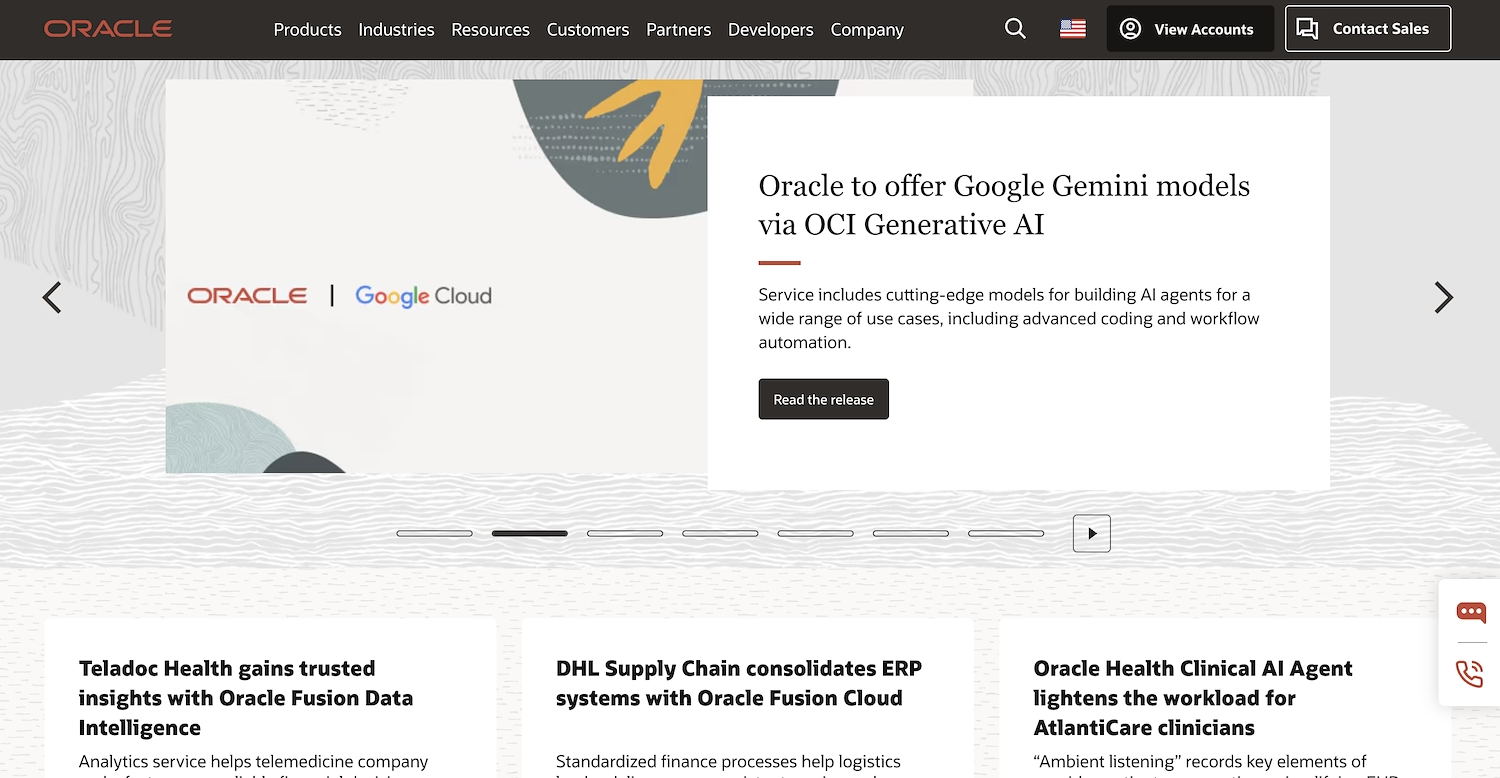
Oracle CPQ is a cloud application that guides sellers through product configurations to produce quotes and documents. It connects CRM and ERP data to speed up the quote-to-cash cycle. The platform creates quotes and proposals in multiple languages and formats.
It includes a document designer for branded materials like SOWs and contracts. The system also provides integrated contract management with features for redlining, version comparison, and e-signature routing.
Oracle CPQ's Main Features
- Guides sellers through product configurations to produce quotes and documents.
- Connects CRM and ERP data to speed up the quote-to-cash cycle.
- Creates quotes and proposals in multiple languages and formats.
- Includes integrated contract management with redlining, version comparison, and e-signature routing.
How Oracle CPQ Compares to DealHub
Average Review score: 4.0/5 stars based on 260 G2 reviews.
- A guided selling feature in Oracle CPQ helps sales reps select correct products. This provides more structure than DealHub's open proposal creation.
- It connects with both CRM and ERP systems to use data from both. This integration scope is broader than DealHub's primary focus on CRM.
- The tool includes integrated contract management with redlining and version comparison. This offers a more complete contract solution than DealHub's proposal functions.
- This platform handles highly complex product configurations and pricing rules, a more advanced function for intricate product catalogs than what DealHub provides.
- Oracle CPQ creates quotes and proposals in multiple languages. This gives global sales teams more flexibility than DealHub's standard document generation.
Potential Drawbacks Compared to DealHub
- Oracle CPQ sometimes presents a steep learning curve due to its complex interface. This may require more training compared to DealHub, which offers a more focused user experience for proposal tasks.
- The tool's user interface customization can be limited without specific technical skills. In contrast, DealHub often provides more direct options for teams to personalize proposals and documents without developer help.
- Some users report performance delays, such as slow save times, with Oracle CPQ. DealHub's focus on a narrower set of features can result in a more responsive experience for its core functions.
Pricing and Cost Comparison
While we've covered key features and use cases in this comparison, pricing models can vary significantly between tools. For the most accurate and up-to-date pricing information, we recommend visiting Oracle CPQ's official website.
4) SAP CPQ
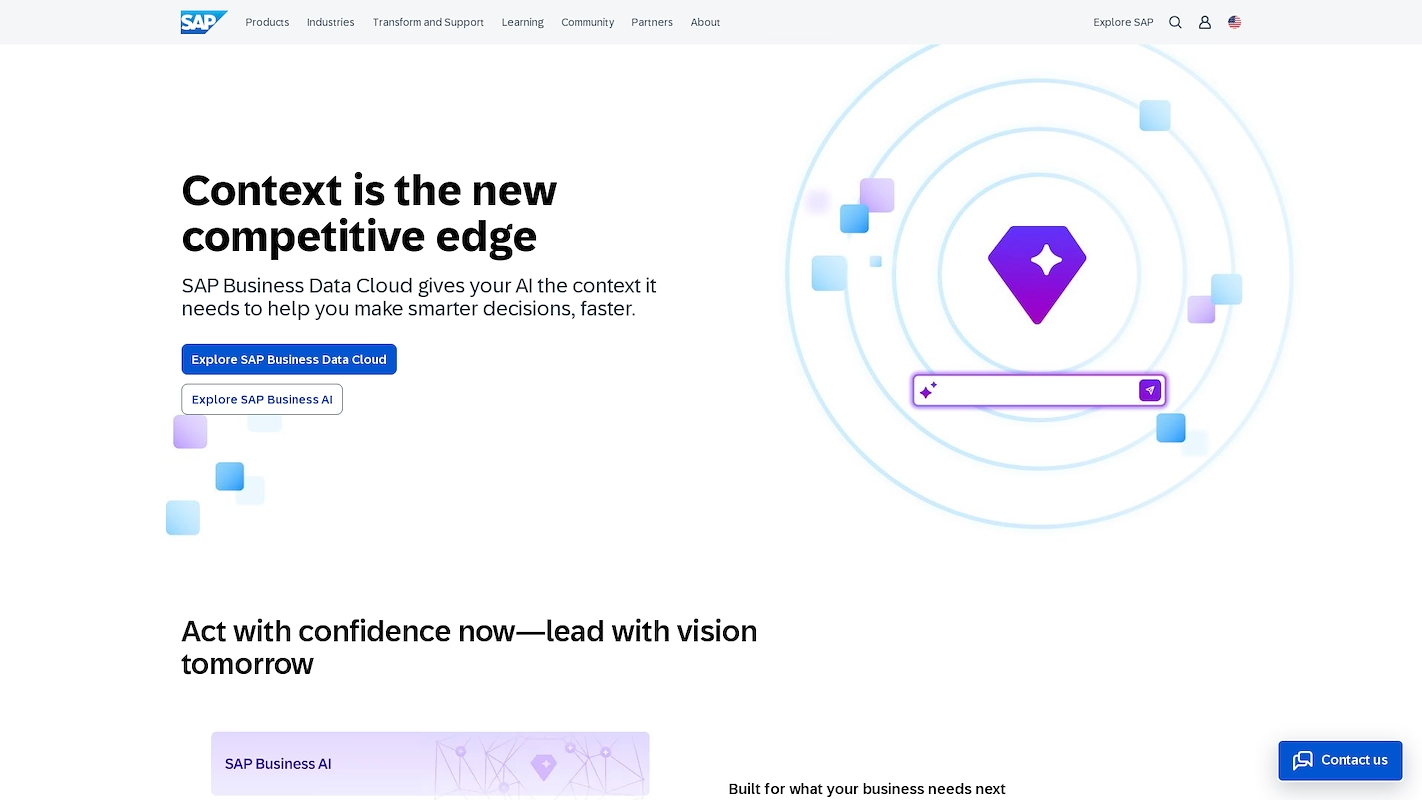
SAP CPQ is a solution that helps sales teams create quotes for complex product configurations. The software automates sales document creation. It generates professional proposals and contracts with a few clicks. This tool supports sales representatives and channel partners with a system to produce accurate quotes and documents.
SAP CPQ's Main Features
- Creates quotes for complex product configurations.
- Automates sales document creation, including proposals and contracts.
- Supports sales representatives and channel partners with a system to produce accurate quotes.
How SAP CPQ Compares to DealHub
Average Review score: 4.0/5 stars based on 76 G2 reviews.
- The tool supports mobile users, so sales teams can create quotes from any mobile device. This allows for immediate quote generation in the field, a feature distinct from DealHub's primary focus on proposal management.
- It has built-in support for channel partners, which lets external sales teams generate their own quotes. This broadens the user base beyond an internal team, a different model from DealHub's focus on direct sales operations.
- The platform connects with e-commerce platforms, which lets customers configure products and place orders on their own. This self-service capability is a feature not central to DealHub's sales-facing proposal tools.
- SAP CPQ includes tools to manage sales commissions, which simplifies updates and reporting on deals. This is a back-office function that is different from the proposal generation focus of DealHub.
Potential Drawbacks Compared to DealHub
- SAP CPQ may require technical skills like HTML and CSS for UI customization. This is different from DealHub, which often provides more direct options for branding proposals without coding knowledge.
- Some users report performance issues with the tool, especially with larger quotes. In comparison, DealHub's focus on a narrower set of features can result in a more responsive experience for its core tasks.
- It might have a steeper learning curve due to limited documentation, as some users note. DealHub's specialized nature for proposals can make it more intuitive for teams to adopt for that specific purpose.
Pricing and Cost Comparison
While we've covered key features and use cases in this comparison, pricing models can vary significantly between tools. For the most accurate and up-to-date pricing information, we recommend visiting SAP CPQ's official website.
5) PROS Smart CPQ
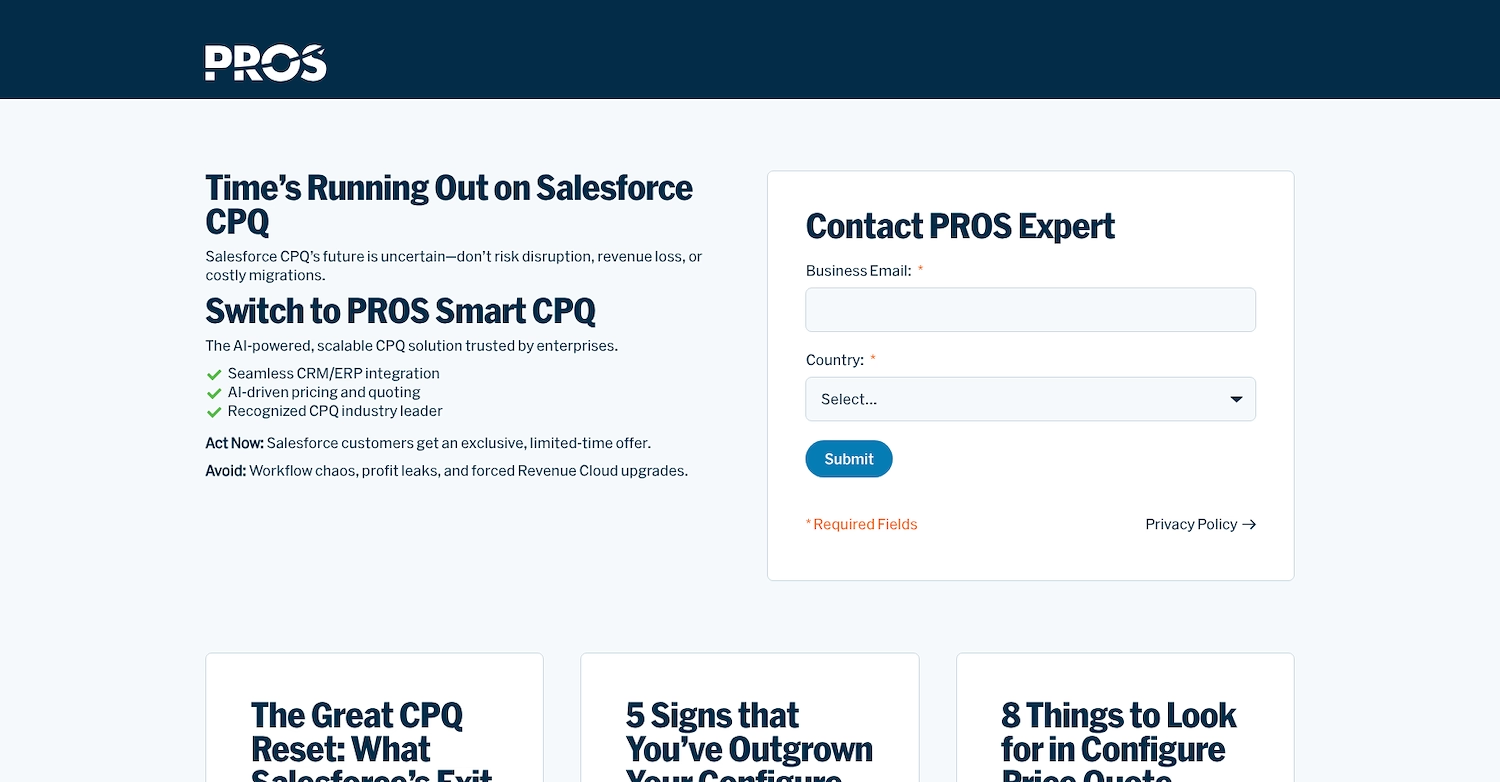
PROS Smart CPQ is a platform for B2B companies that automates the quote-to-cash process. It uses AI to provide price recommendations. The software helps sales teams create and manage quotes, then generate proposals and other sales documents for prospects.
The system also includes tools to track document engagement after a proposal is sent.
PROS Smart CPQ's Main Features
- Uses AI to provide pricing and quoting recommendations.
- Integrates with CRM and ERP systems to centralize processes.
- Provides enterprise-grade speed and scale for quoting processes.
How PROS Smart CPQ Compares to DealHub
Average Review score: 4.2/5 stars based on 193 G2 reviews.
- PROS Smart CPQ provides AI-driven price recommendations for sales teams. This is a more automated approach compared to DealHub's manual quote creation process.
- It integrates with various eCommerce channels, which allows for customer self-service. This differs from DealHub's focus on proposals created directly by the sales team.
- The platform offers revenue management capabilities to help optimize company-wide profitability. This function extends beyond the proposal and quote generation features central to DealHub.
- This tool includes workflow management features that connect sales, pricing, and eCommerce teams. This provides a more unified system than DealHub's workflow, which is centered on the sales proposal process.
Potential Drawbacks Compared to DealHub
- Some users report that PROS Smart CPQ has a difficult learning process due to its complexity. This is different from DealHub, which offers a more focused user experience for its core proposal features.
- The tool's implementation can be lengthy, with reports indicating it takes several months. In comparison, DealHub's specialized nature often allows for a quicker setup centered on proposal and quoting tasks.
- It sometimes experiences performance delays, especially with complex configurations. DealHub's focus on a narrower set of features can result in a more responsive experience for its main functions.
Pricing and Cost Comparison
While we've covered key features and use cases in this comparison, pricing models can vary significantly between tools. For the most accurate and up-to-date pricing information, we recommend visiting PROS Smart CPQ's official website.
Try 11x for a Different Approach
Unlike the CPQ tools reviewed, 11x focuses on automating top-of-funnel sales activities. If your main challenge is lead generation and outreach, not quoting, this platform offers a targeted solution with its digital sales representatives.
For leadership looking to deploy AI agents for these specific tasks, exploring 11x provides a clear view of this alternative strategy. You can get more details on their website.
With 11x, we run your sales playbook. Our AI agent Alice finds accounts and starts outreach, while Julian qualifies leads and sets meetings. We consolidate tools for data enrichment, outreach, and email warmup into a single platform, so you do not need extra software.
Book a demo to see it in action.
6) Tacton CPQ
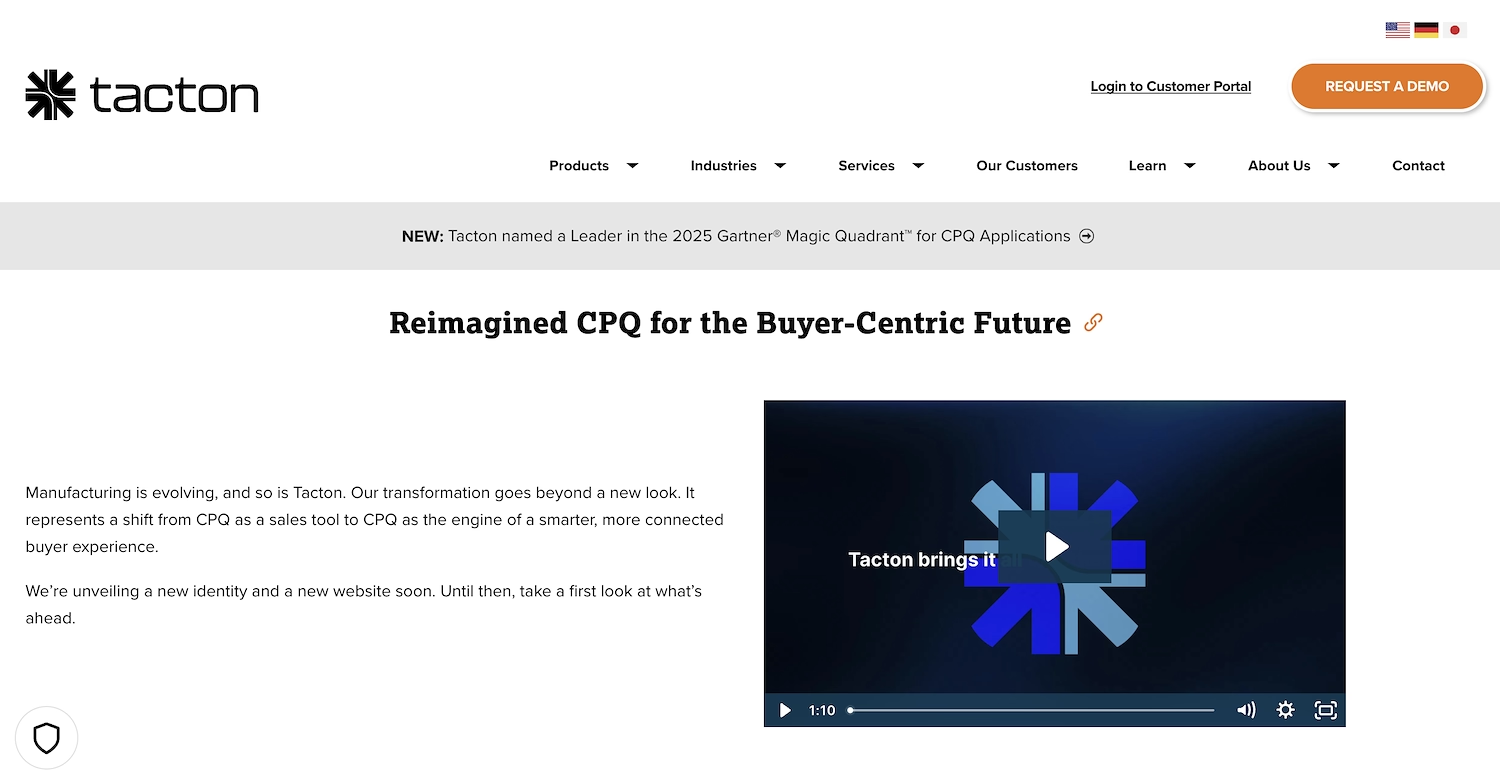
Tacton CPQ is a platform for sales teams that handles product configuration and quote generation. The system creates sales documents, such as proposals, for companies with complex products. It provides tools for document creation and proposal management, and it allows sales to track document status.
Tacton CPQ's Main Features
- Handles product configuration and quote generation.
- Creates sales documents for companies with complex products.
- Provides tools for document creation and proposal management.
- Allows sales teams to track document status.
How Tacton CPQ Compares to DealHub
Average Review score: 4.3/5 stars based on 54 G2 reviews.
- Tacton CPQ provides real-time 3D product visualization and automatic CAD file generation, features for complex manufacturing that differ from DealHub's standard document creation.
- It supports omni-channel sales, which allows end customers to configure products through eCommerce, a different model than DealHub's sales-team-focused proposal system.
- The tool integrates with manufacturing systems like PLM and ERP in addition to CRM, offering a broader data connection than DealHub's primary CRM focus.
- This platform uses needs-based configuration for highly customizable products, providing more specialized guidance than DealHub's general proposal functions.
Potential Drawbacks Compared To DealHub
- Tacton CPQ sometimes has a steeper learning curve due to its focus on complex manufacturing. DealHub's platform is often more direct for teams that only need proposal and quote features.
- Its implementation can be lengthy, with some reports of it taking several months. In contrast, DealHub's specialized nature often allows for a quicker setup for its core proposal and quoting tasks.
- Some users note the platform is a significant investment. The return on investment might take longer compared to DealHub, which is more specialized for proposal generation and may offer a faster financial return.
- Customizing the user interface sometimes requires technical skills. This is different from DealHub, which often provides more direct options for sales teams to brand proposals without developer help.
Pricing and Cost Comparison
While we've covered key features and use cases in this comparison, pricing models can vary significantly between tools. For the most accurate and up-to-date pricing information, we recommend visiting Tacton CPQ's official website.
7) PandaDoc
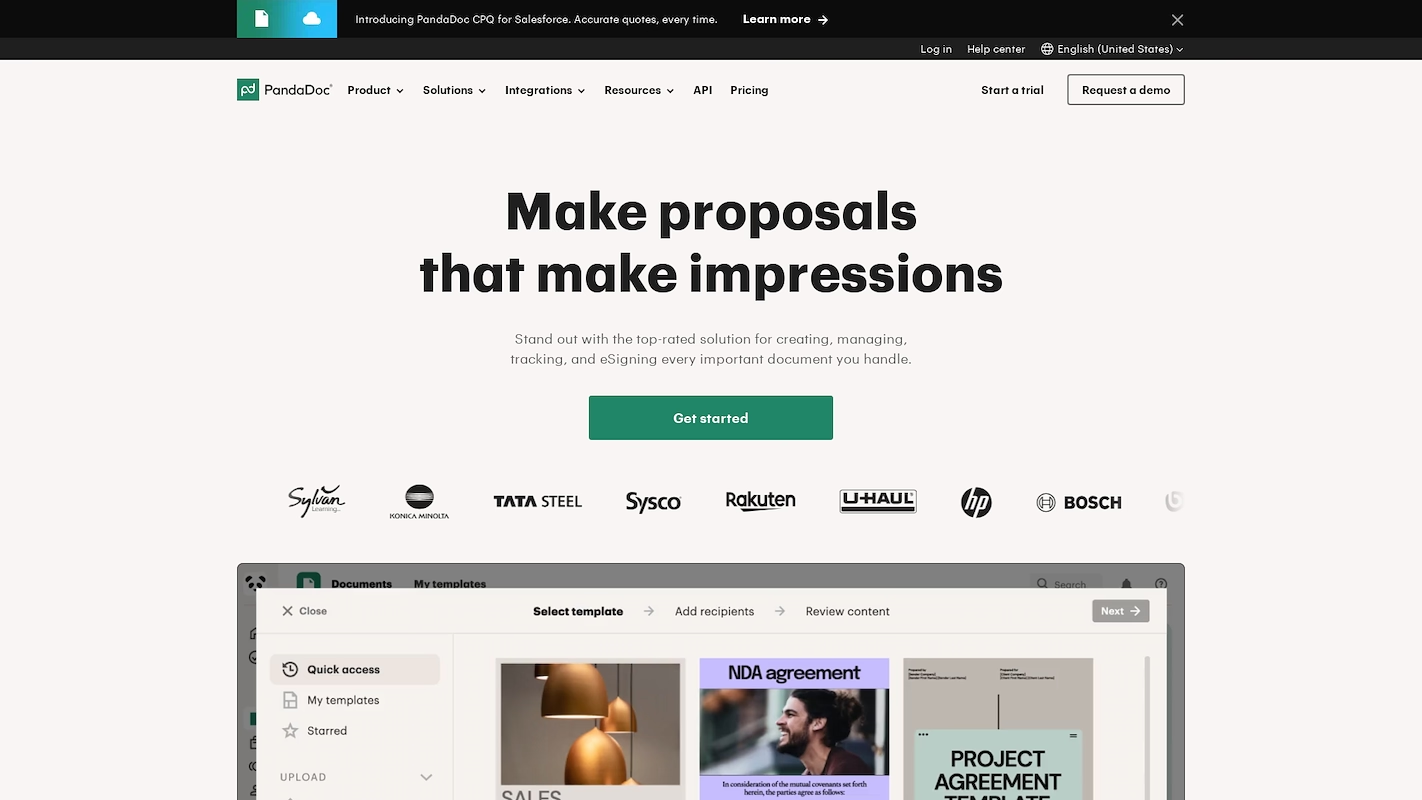
PandaDoc is a document automation software. It helps users create, manage, and share documents online, such as proposals, quotes, and contracts. The platform is for sales, marketing, and HR teams.
It offers features like e-signatures and templates. A key function provides real-time notifications when a recipient opens, views, or completes a document. This gives insight into the deal workflow.
PandaDoc's Main Features
- Builds documents like proposals and contracts with a drag-and-drop editor and reusable templates.
- Provides digital deal rooms that support real-time comments, redlines, and approvals.
- Embeds payment options from Stripe, PayPal, and Square directly within documents for immediate collection.
- Offers legally binding e-signatures that include signing order, signer identity verification, and notarization.
How PandaDoc Compares to DealHub
Average Review score: 4.7/5 stars based on 2,893 G2 reviews.
- PandaDoc offers legally binding e-signatures that include signer identity verification and notarization, providing a different level of security compared to the standard signature functions in DealHub.
- It allows users to embed payment options from services like Stripe and PayPal directly into documents, which lets clients pay immediately upon signing.
- The tool provides a drag-and-drop editor and reusable templates, offering a flexible document creation experience compared to DealHub's more structured proposal builder.
- This platform includes digital deal rooms that support real-time comments and redlines, facilitating direct collaboration on documents, a different approach from DealHub's focus on engagement tracking.
Potential Drawbacks Compared To DealHub
- PandaDoc offers limited Configure, Price, Quote (CPQ) functions. It lacks the guided selling or complex product configuration of DealHub, which can make building detailed quotes a more manual task for sales reps.
- Its deal room feature focuses on document collaboration and redlining. This differs from DealHub's Digital DealRoom, which serves as a single hub for all content and communication related to an entire deal.
- Some users find the tool is less specialized for sales quoting. Since it supports multiple departments like HR, it may lack the dedicated quote-to-close workflow that is central to the DealHub platform.
Pricing and Cost Comparison
PandaDoc offers transparent pricing with plans at $19 and $49 per seat per month, which you can view on their official website. DealHub does not publish its pricing, so a direct comparison is not possible. This difference means PandaDoc provides cost predictability, while DealHub requires a custom quote.
8) GetAccept
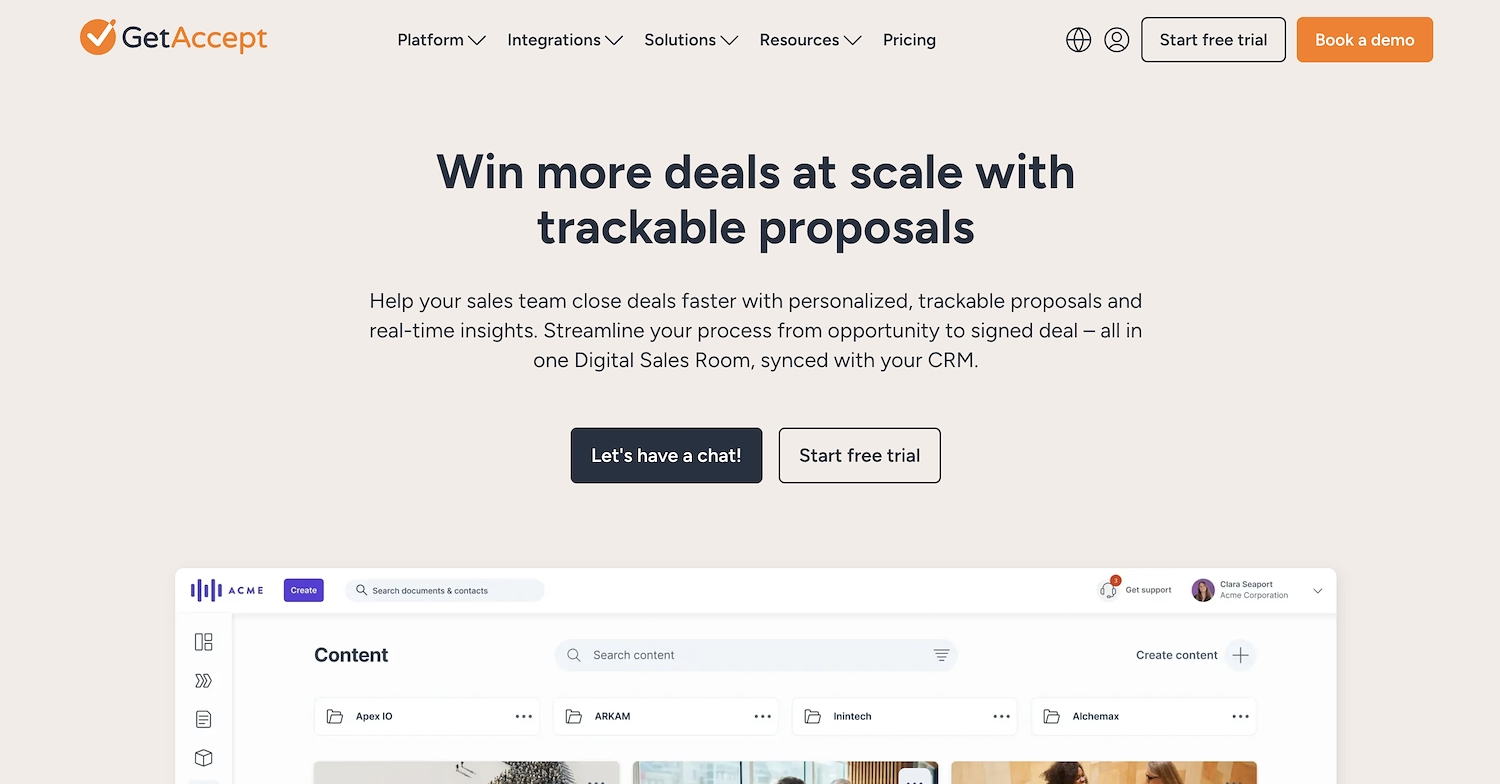
GetAccept is a sales platform that helps teams create and manage documents like proposals and contracts. It provides tools to track documents with real-time notifications and includes e-signature capabilities. The software centralizes the sales process from the initial conversation to the final signed agreement.
GetAccept's Main Features
- Provides a digital sales room with separate deal and contract rooms for buyer and seller collaboration.
- Manages the signature process with automated reminders, expiration dates, and a detailed audit trail.
- Offers user, role, and access management to control document permissions within teams.
- Includes personal video messaging and live chat features to engage with prospects directly.
How GetAccept Compares to DealHub
Average Review score: 4.6/5 stars based on 1,023 G2 reviews.
- GetAccept provides a digital sales room with separate spaces for deals and contracts, which differs from DealHub's single DealRoom by separating early-stage collaboration from final negotiations.
- The platform includes personal video messaging and live chat, offering direct communication within sales documents, a different engagement method than DealHub's document tracking.
- It manages the signature process with automated reminders and a detailed audit trail, providing more control over the signing workflow compared to the standard e-signature functions in DealHub.
- This tool allows for the creation of mutual action plans with the buyer, a feature for collaborative project planning that is distinct from DealHub's focus on content presentation.
Potential Drawbacks Compared To DealHub
- GetAccept lacks a full Configure, Price, Quote (CPQ) system. This is different from DealHub, which offers guided selling for complex product configurations. This can make building detailed quotes a more manual task for sales reps.
- The platform uses separate rooms for deals and contracts. Some teams may prefer DealHub's single Digital DealRoom, which consolidates all content and communication into one unified space for the entire deal cycle.
- It centers on document management and e-signature features. In comparison, DealHub provides a more complete quote-to-close workflow, which includes features like a sales playbook and automated deal flow.
Pricing and Cost Comparison
GetAccept offers transparent pricing with plans at $25 and $49 per user per month, which you can view on their official website. DealHub does not publish its pricing, so a direct comparison is not possible. This difference means GetAccept provides cost predictability, while DealHub requires a custom quote.
9) Qwilr

Qwilr helps teams create proposals and other sales documents as interactive web pages. The platform is for sales teams that present information through a web-based interface instead of static files.
It includes tools to build quotes, track document views, and capture e-signatures. This system centralizes sales collateral online and provides analytics on client engagement.
Qwilr's Main Features
- Turns sales documents into interactive web pages that are shared via a URL instead of static files.
- Includes an interactive quote block that allows buyers to select plans, add extras, sign, and pay within the page.
- Provides engagement tracking to see what content buyers read and click on within the document.
- Features a brand editor to apply consistent company fonts and colors across all sales materials.
How Qwilr Compares to DealHub
Average Review score: 4.6/5 stars based on 802 G2 reviews.
- Qwilr presents sales documents as interactive web pages instead of static files. This is different from DealHub, which uses a central Digital DealRoom to host various content types.
- The tool includes an interactive quote block that lets buyers select plans or add extras themselves. This offers more buyer-driven flexibility compared to the more structured quoting process in DealHub.
- It allows for direct payment integration within the proposal page itself. This function lets a client pay immediately after signing, a feature not central to DealHub's core quote-to-close workflow.
- This platform provides a dedicated brand editor to apply consistent company fonts and colors across all sales materials, offering a specific tool for branding that differs from DealHub's general proposal templates.
Potential Drawbacks Compared To DealHub
- Qwilr does not offer a full Configure, Price, Quote (CPQ) system. This is different from DealHub, which includes guided selling to help sales reps build accurate quotes for complex product configurations.
- The tool turns sales materials into individual web pages. Some teams may find DealHub's single Digital DealRoom more useful, as it consolidates all deal content and communication into one unified space.
- It focuses mainly on document creation and presentation. In comparison, DealHub provides a more structured quote-to-close workflow that includes a sales playbook to guide the entire sales process.
Pricing and Cost Comparison
Qwilr offers transparent pricing, with plans starting at $35 per user per month. In contrast, DealHub does not publish its pricing, requiring a custom quote. This difference means Qwilr provides cost predictability, while DealHub's pricing is tailored to specific needs. You can view plans on Qwilr's official website.
10) QuoteWerks
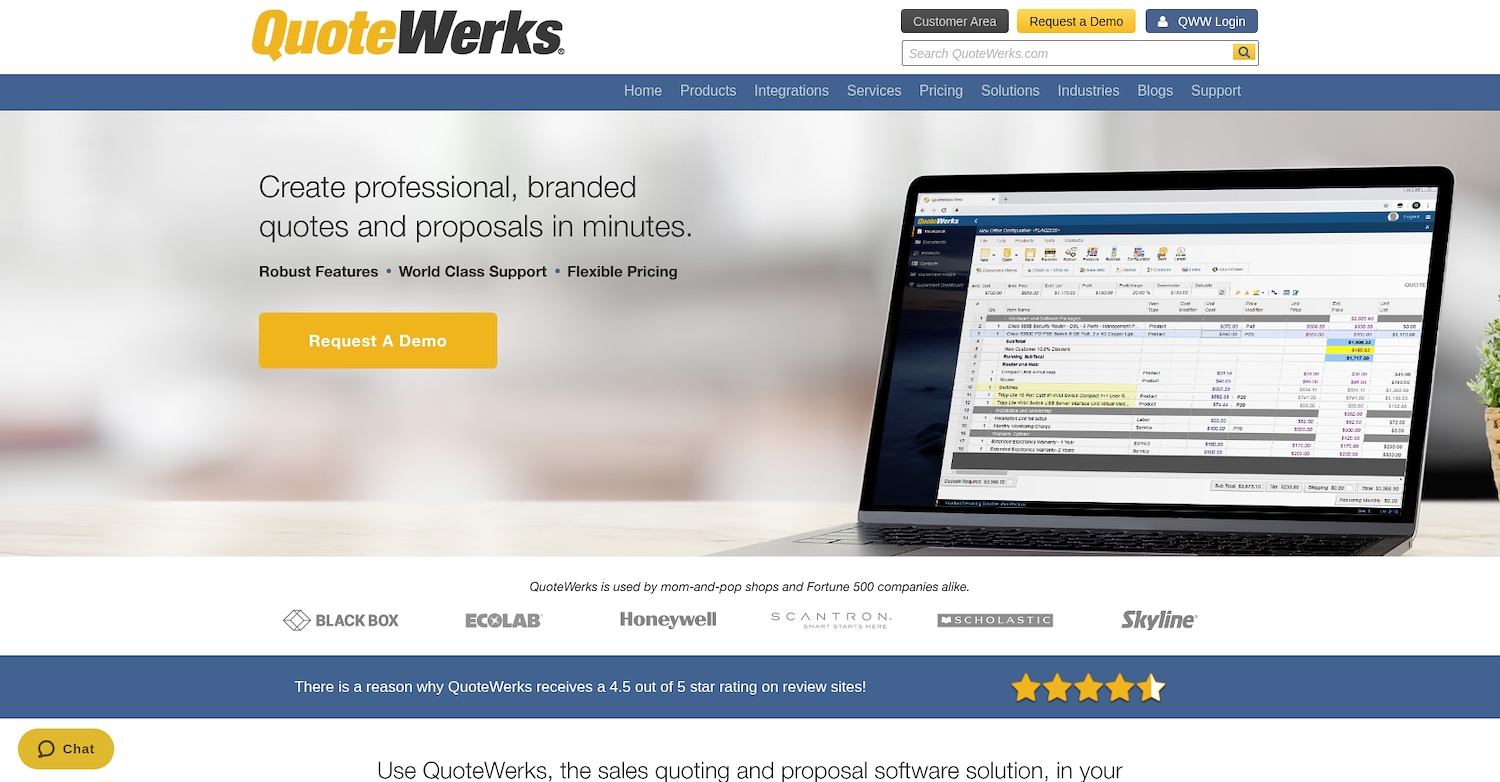
QuoteWerks is a software solution for the sales quoting and proposal process. It allows teams to create detailed quotes, manage procurement from distributors, and track document views through notifications. The system integrates with CRM and accounting applications to support the quote-to-cash cycle.
QuoteWerks's Main Features
- Integrates with distributors like Tech Data and Ingram Micro for real-time pricing and availability.
- Submits electronic purchase orders to vendors and tracks order status, including shipping numbers.
- Connects with accounting software like QuickBooks and Sage 50 for order processing.
- Collects credit card payments and deposits through its QuoteValet add-on.
How QuoteWerks Compares To DealHub
Average Review score: 4.3/5 stars based on 182 G2 reviews.
- QuoteWerks connects directly with distributors like Tech Data and Ingram Micro for real-time pricing. This provides a different level of supply chain data compared to DealHub's sales-focused platform.
- The tool submits electronic purchase orders to vendors and tracks order status. This is a procurement function that extends beyond DealHub's quote-to-close workflow.
- It integrates with accounting software like QuickBooks and Sage 50. This offers a more direct connection to back-office financial systems than DealHub's primary CRM integration.
- Its QuoteValet add-on collects deposits and payments directly from the quote. This is a different approach to DealHub, which focuses on the proposal and approval stages.
Potential Drawbacks Compared To DealHub
- Some users report the user interface feels less modern. This is different from DealHub's platform, which provides a more contemporary user experience for sales teams.
- The tool does not offer a central digital deal room for all content and communication. In comparison, DealHub provides a single, unified space where stakeholders can access all deal-related materials.
- It lacks a built-in sales playbook to guide the entire sales process. This is a feature DealHub includes to help reps follow consistent steps from quote to close.
- QuoteWerks often operates as a desktop application. This might feel less seamless for teams that prefer a fully cloud-native platform like DealHub, which works entirely in a web browser.
Pricing and Cost Comparison
QuoteWerks offers transparent pricing with plans from $15 per user per month, viewable on QuoteWerks's official website. In contrast, DealHub does not publish its pricing, requiring a custom quote. This gives QuoteWerks cost predictability, while DealHub's pricing is tailored to specific business needs.
Which One Should You Go With?
Choosing a DealHub alternative depends on many variables. This guide shared several options to help you compare platforms and decide on the right fit for your business.
If your main challenge is top-of-funnel sales instead of quoting, consider 11x. Its AI agents automate lead generation and outreach, offering a different solution for building your sales pipeline. This approach consolidates several tools into a single platform.



